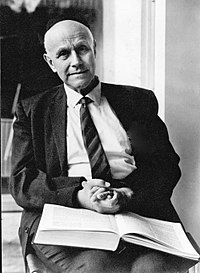Ernst Simon (philosopher)
Ernst Akiba Simon (born March 15, 1899 in Berlin ; † August 18, 1988 in Jerusalem ) was an Israeli religious philosopher, educator and historian of German origin.
Life
Simon grew up in an assimilated German-Jewish family. As a high school student enthusiastic about German national patriotism , Simon volunteered at the front. However, due to the anti-Semitism prevailing in the army and after being wounded at Verdun , he lost his patriotic attitude. In search of his identity, he found his place in the Zionist Jewish student movement during his studies .
From 1919 Simon studied German , history and philosophy in Berlin ; later he moved to Heidelberg with these subjects . He received his doctorate from the historian Hermann Oncken in 1923 with a thesis “ About Ranke and Hegel ”. Three years later he passed his state examination in German studies in Frankfurt . He then taught there as a study assessor.
Services
Simon was involved in the Free Jewish Teaching House and worked on Buber's magazine Der Jude as an editor from 1923 to 1928. In 1928 Simon emigrated to Palestine with his wife and worked there as a lecturer in theology and philosophy at the Hebrew University of Jerusalem . At Buber's request, he returned to Germany for six months in 1934 and helped him with his work in adult education. At the end of 1934, Simon finally left National Socialist Germany and returned to the Hebrew University to resume teaching there. In 1950, Simon took over a professorship for philosophy and history of education.
Following Peter Wust , Simon developed the notion of a “ second naivety ” - an attitude “that enables us to hold on to religious belief without giving up the skepticism attached to secular experience”.
Together with Martin Buber and Gershom Scholem , he became a member of the Brit Shalom peace union , which campaigned for Jewish-Arab understanding and a binational Jewish-Palestinian state. Even after the founding of the state of Israel , Simon and several other intellectuals were among the critics of Israeli politics. In 1955 he was instrumental in founding the Leo Baeck Institute . Visiting professorships and lecture tours have taken him repeatedly to Europe and the USA.
Ernst Simon died in Jerusalem in 1988 at the age of 89 . After his death, the Moses Mendelssohn Center at the University of Potsdam acquired its 6,000-volume library.
Writings and letters
- with Martin Buber , Judah Leon Magnes (eds.): Towards Union in Palestine. Essays on Zionism and Jewish-Arab cooperation. IHUD (Union) Association, Jerusalem 1947.
- Construction in decline. Jewish adult education in National Socialist Germany as spiritual resistance. Mohr, Tübingen 1959 (= series of scientific treatises of the Leo Baeck Institute of Jews from Germany , 2).
- Bridges. Collected Essays. Schneider, Heidelberg 1965.
- Self-expression . In: Pedagogy in self-portrayals. Volume 1. Meiner, Hamburg 1975, ISBN 3-7873-0344-8 , pp. 272–333.
- Decision on Judaism. Essays and lectures. Suhrkamp, Frankfurt 1980 (= Library Suhrkamp , 641).
- Sixty years against the current. Letters from 1917 to 1984. Ed. By LBI, Jerusalem. Mohr Siebeck, Tübingen 1998, ISBN 3-16-147000-1 (= series of scientific treatises of the Leo Baeck Institute , 59).
- Letter from Leo Strauss, in: Munich Contributions to Jewish History and Culture . Edited by the Chair of Jewish History and Culture, Michael Brenner . H. 2, 2013, pp. 23–28 (with subsequent commentary by Thomas Meyer). Without ISSN. Access .
- Hannah Arendt - An analysis , in: Friedrich Krummacher (ed.): The controversy Hannah Arendt, Eichmann and the Jews , Nymphenburger, Munich 1964, pp. 39-77.
literature
- Rudolf Lennert : About the life of the German language in Jerusalem , in: New collection. Volume 6. Göttingen 1966, pp. 617–627 (about Ernst Simon, Ludwig Strauss and Werner Kraft ).
- Jan Woppowa: Ernst Simon. In: Biographisch-Bibliographisches Kirchenlexikon (BBKL). Volume 21, Bautz, Nordhausen 2003, ISBN 3-88309-110-3 , Sp. 1439-1446. .
- Jan Woppowa: Resistance and Tolerance. Basic lines of Jewish adult education with Ernst Akiba Simon (1899–1988). Kohlhammer, Stuttgart 2005 (= Practical Theology Today , Volume 77).
- Jan Woppowa: Simon, Ernst Akiba. In: New German Biography (NDB). Volume 24, Duncker & Humblot, Berlin 2010, ISBN 978-3-428-11205-0 , p. 430 f. ( Digitized version ).
Web links
- Literature by and about Ernst Simon in the catalog of the German National Library
Individual evidence
- ↑ Ulrich Raulff , Gary Smith (ed.): Knowledge images: strategies of tradition . Akademie-Verlag, Berlin, 1999, ISBN 978-3-05-002529-2 , p. 237.
| personal data | |
|---|---|
| SURNAME | Simon, Ernst |
| ALTERNATIVE NAMES | Simon, Ernst Akiba |
| BRIEF DESCRIPTION | German-Jewish pedagogue and religious philosopher |
| DATE OF BIRTH | March 15, 1899 |
| PLACE OF BIRTH | Berlin |
| DATE OF DEATH | August 18, 1988 |
| Place of death | Jerusalem |
